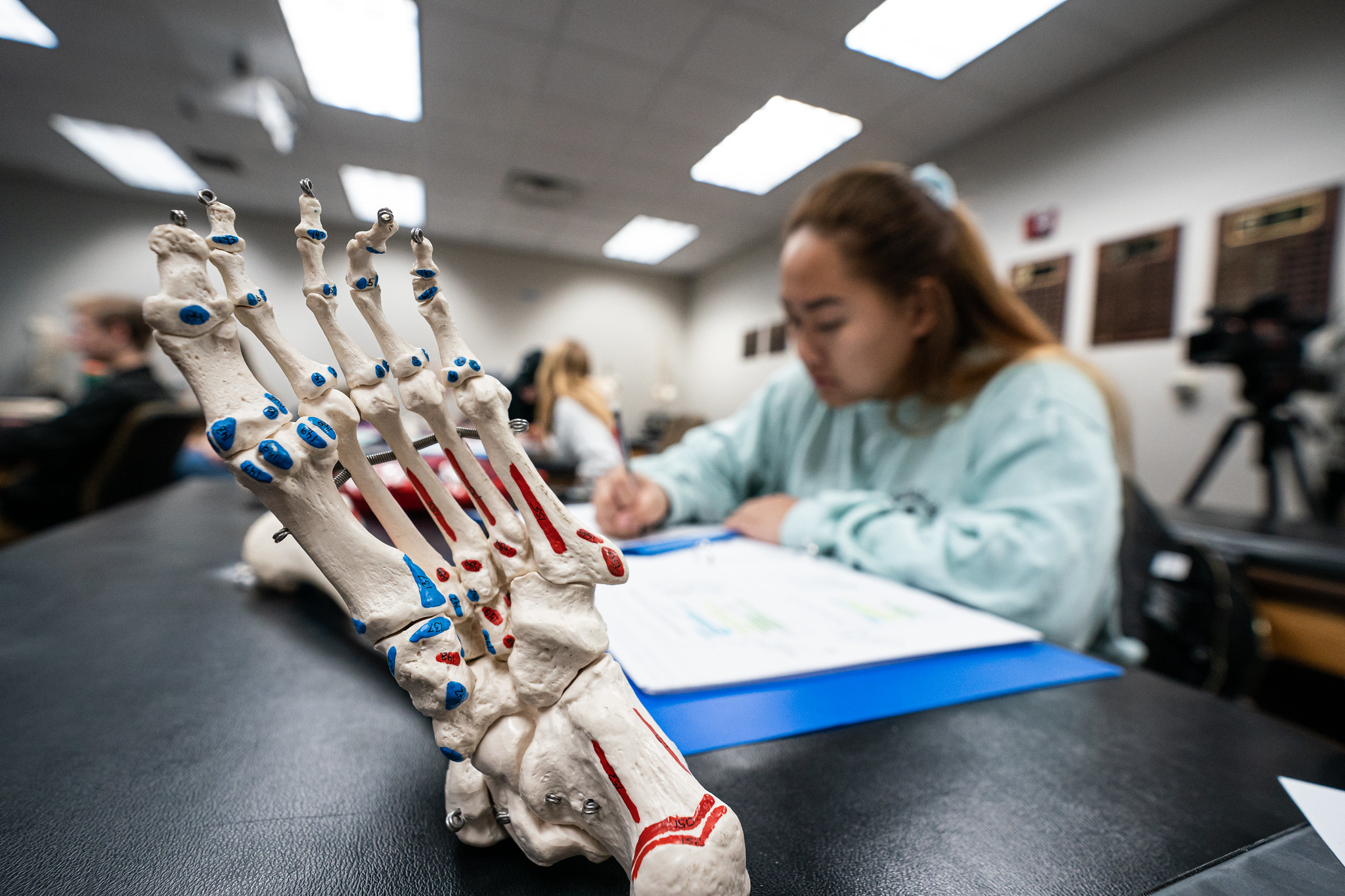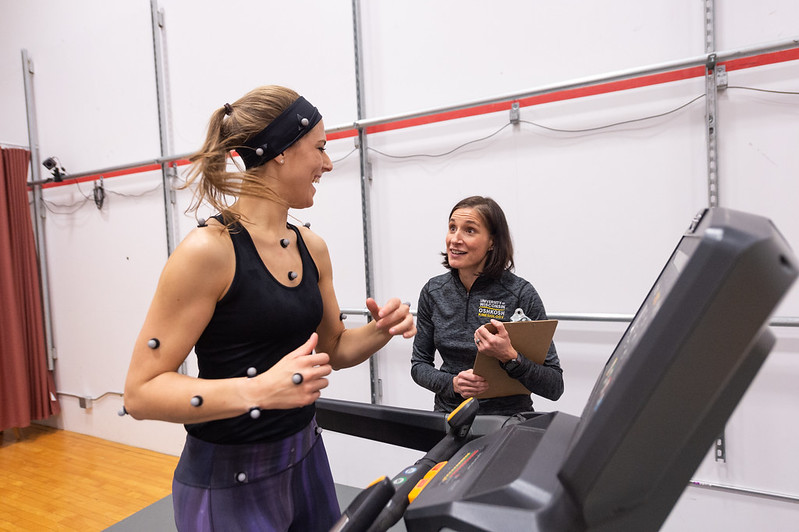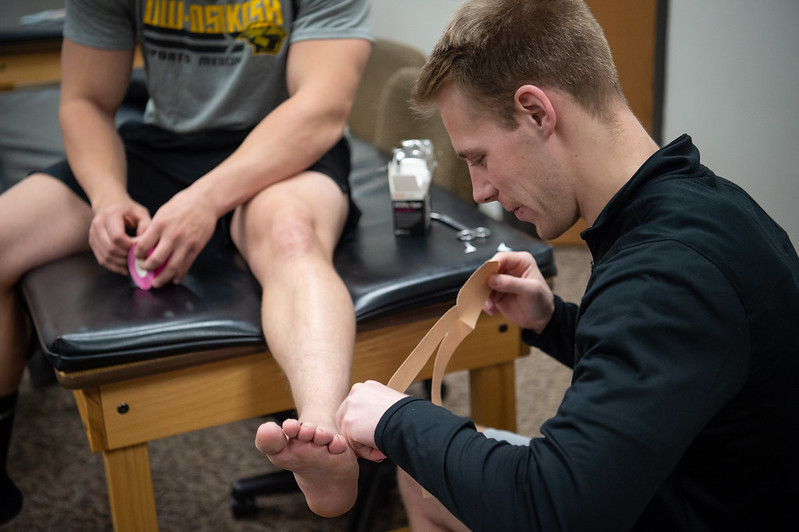Rehabilitation Science
Jump To
Contact Us
Albee Hall, Rm 105
(920) 424-0834
kin@uwosh.edu
Office Hours: 7:30 a.m. - 1:30 p.m.
Quick Links
Healing and restoring active populations
The Rehabilitation Science major utilizes a strong scientific base and flexible curriculum options for students interested in healthcare fields, preparing students for graduate programs in athletic training, physical therapy, occupational therapy and chiropractic medicine.

Learn more

Is This Major for Me?
Students who select the Rehabilitation Science major are often embarking on journeys that involve graduate school.
Many students seek professional licensure to become athletic trainers, physical therapists, occupational therapists, chiropractors, and more.
If you want to become a licensed medical professional and plan to go to graduate school to do so, the Rehabilitation Science major is for you.

How Can I Use This Major?
The Rehabilitation Science major is specifically designed for students interested in careers in healthcare or research. Therefore, these graduates will primarily work in the following areas:
- Athletic trainer
- Physical therapist
- Occupational therapist
- Chiropractor
- Researcher
- Biomechanist
- College Professor
NOTE: Graduate education or additional training is necessary for careers in this area.
Curriculum
Pre-Admission Courses (9 cr.)
Kinesiology 121 – Orientation to Kinesiology (1 cr)
Kinesiology 122 – Kinesiology Admissions Seminar (1 cr)
Kinesiology 170 – Medical Terminology (1 cr)
Kinesiology 171 – Prevention, Recognition, & Treatment of Athletic Injuries (2 cr)
Biology 211 – Human Anatomy (26-105) (4 cr) [BIO 105]
Required CourseS (29 cr.)
Biology 212 – Human Physiology (4 cr) [BIO 211]
Kinesiology 173 – Applied Anatomy and Kinesiology (3 cr)
Kinesiology 201 – Strength Training Techniques (1 cr)
Kinesiology 331- Motor Learning (3 cr) [PSY 101]
Kinesiology 340- Biomechanics (3 cr)
Kinesiology 349 – Behavioral Aspects of Kinesiology (3 cr) [PSY 101]
Kinesiology 350 – Physiology of Exercise (3 cr) [BIO 212]
Kinesiology 351 – Nutrition for Health & Performance (3 cr) [KIN 350]
Kinesiology 361 – Medical Aspects of Kinesiology (3 cr) [KIN 350]
Kinesiology 368 – Research Techniques in Kinesiology (3 cr) [Stats class]
Elective CourseS (Choose 10 cr.)
Kinesiology 104 – AED, CPR, and First Aid (1 cr)
Kinesiology 200 – Strength and Conditioning Practicum (1 cr) [KIN 201]
Kinesiology 202 – Advanced Strength Training Techniques (1 cr) [KIN 201]
Kinesiology 320 – Business of Wellness (3 cr)
Kinesiology 352 – Performance Assessment Techniques (3 cr) [KIN 350]
Kinesiology 363 – Addictive, Ergogenic, & Therapeutic Agents (2 cr)
Kinesiology 370 – Principles of Strength Training & Conditioning (3 cr) [KIN 350]
Kinesiology 371 – Strength & Conditioning Program Design (3 cr) [KIN 370]
Kinesiology 380 – Running Injuries, Assessment, & Intervention (3 cr) [KIN 340 & KIN 350]
Kinesiology 405 – Group Exercise Leadership (1 cr) [KIN 201]
Kinesiology 407 – Clinical Experience in E&F (3 cr) [KIN 352]
Kinesiology 410 – Applied Biomechanical Principles and Techniques (3 cr) [KIN 340 & Math 106]
Kinesiology 415 – Ergonomics (3 cr)
Kinesiology 425 – Current Topics in Kinesiology (1-3 cr) [KIN 350]
Kinesiology 427 – Professional Preparation in Strength and Conditioning (3 cr) [KIN 370]
Kinesiology 443 – Progressive Training Techniques (2 cr) [KIN 370]
Kinesiology 446 – Kinesiology Independent Study (1-3 cr)
Kinesiology 447 – Administration and Facilities Management (3 cr) [KIN 350]
Kinesiology 450 – Advanced Physiology of Exercise (3 cr) [KIN 350]
Kinesiology 461 – Clinical Experience in S&C (3 cr) [KIN 370]
Kinesiology 474 – Honor’s Thesis (1-3 cr)
Professional School Prerequisites (15 cr.)
To graduate with a Rehabilitation Science degree, 15 credits from common professional school prerequisites are required. Below are common prerequisites for each type of graduate program. However, students should review their specific future graduate schools to learn the exact prerequisites for those programs as some may have different or additional courses required.
Physical Therapy
Chemistry 105 (5)
Chemistry 106 (5)
Physics/Astronomy 171 (5)*
Physics/Astronomy 172 (5)
Math 201 (3)
Occupational Therapy
Chemistry 105 (5)
Physics/Astr. 171 (5)*
Math 201 (3)
Psychology 303 (3)
Psychology 338, Psychology 360, or Psychology 391 (3-6)
Athletic Training
Chemistry 105 (5)
Physics/Astr. 171 (5)*
Math 201 (3)
Math 106 (2)
Upper-level Psychology
*Math 106, 108 or testing out of trigonometry at admissions is required for enrollment in Physics/Astronomy 171.
Admission To The Major
When students begin at UW Oshkosh with an interest in a Kinesiology major, they are entered into the Pre-Kinesiology major.
In order to obtain admission into one of the majors in the Department of Kinesiology, students must submit an application portfolio. Students are required to complete the Pre-Admissions courses listed above to be considered.
A minimum cumulative GPA of 2.0 is required to be considered for admission and students in the Department of Kinesiology must finish their undergraduate degree with a 2.75 GPA in all Kinesiology courses. Therefore, pre-admission grades and GPA are reviewed during the admissions decision in order to assess the likelihood of success in completing the major.
To apply, a student submits an admission portfolio that includes a cover letter, a resume, and an admissions essay. The deadline for submission of the admission portfolio is on the last Friday of each semester.
Students may apply for admission while the courses are in progress; however, admission is dependent upon successful completion of each course. All applications will be reviewed and evaluated within three weeks following the end of the semester. Students will receive formal notification of the admission committee’s decision no later than five weeks after the semester ends. The decision will be sent to each student’s University email address.
If you have any questions about whether or not you should apply please contact the Admissions Committee chair, Dr. Dan Schmidt (schmidtw@uwosh.edu).
Advising
Kinesiology students will begin advisement at the University Advising Resource Center (UARC). Once students are admitted to a major, they will be assigned a faculty advisor in the Department of Kinesiology. Students are expected to meet with their faculty advisor each semester, at least one week prior to their registration date.
When students arrive at the meeting with their advisor they should bring:
- An updated Academic Report (don’t print)
- A list of courses they plan to take the following semester
- A copy of the the major 4 year plan found on the Student Resources page
A major function of the advisor is to work with the student in designing their curriculum, so they not only complete the requirements of the program but also maximize the worth of their undergraduate education. Another purpose of an academic advisor is to give students counsel with respect to their intended career directions. Although faculty and staff will do their best to follow the student’s progress, it is the student’s responsibility to make absolutely sure they complete all degree requirements and are thus eligible to graduate.
If you have questions prior to program admission, Dr. Kevin Biese, Dr. Kyle Petit, and Dr. Robert Sipes are the primary faculty advisors for this major. Please reach out to any of them if you are interested in this major.
NOTE: It is crucial that students meet with an advisor every semester as courses in the department may not be offered each semester. Your advisor will help you choose the best elective courses for your intended career goals.
Wait List Policy
If a class you’d like to take is full, you may elect to get on the wait list. You can view full courses in TitanWeb by unchecking the “Show Open Only” box when searching for Kinesiology. If the full class has an online wait list, it will display a yellow triangle in the status box. To join the wait list simply “enroll” in the course, checking the box for “wait list if class is full.” You should see a message confirming that you’re on the wait list upon completion.
If you need assistance, contact Deb Suess in the Kinesiology office at (920) 424-0834. Don’t procrastinate, or our ability to help may become limited.
Careers and Internships
Career opportunities in the field of Kinesiology are varied and numerous. The following is a partial list of opportunities.
It’s worth noting that the Rehabilitation Science major does not require an internship, but many students complete clinical classes. Again, a graduate program is necessary for licensed work in rehabilitation, and we always recommend students do observation hours in as many career areas as possible to find the best fit for their future career.
- Athletic Trainer
- Physical Therapist
- Occupational Therapist
- Chiropractor
- Researcher
- Biomechanist
- Professor

